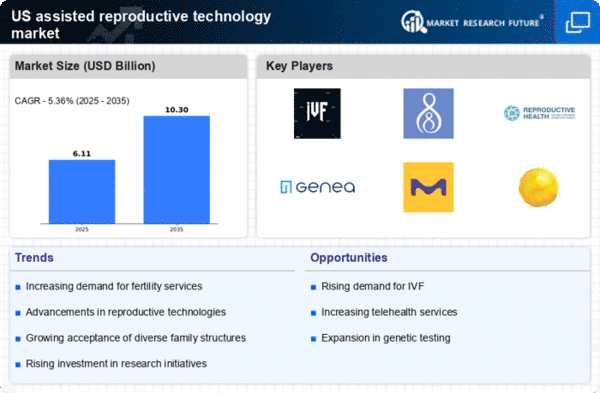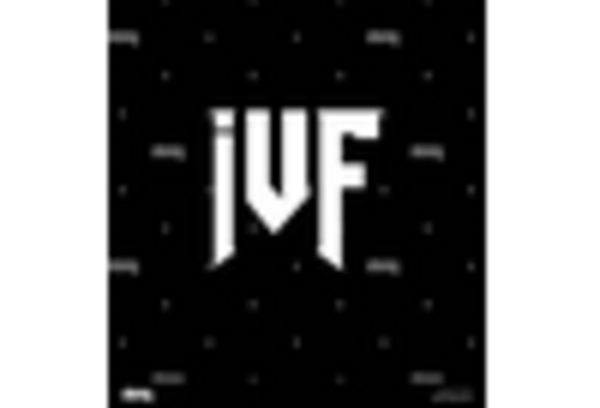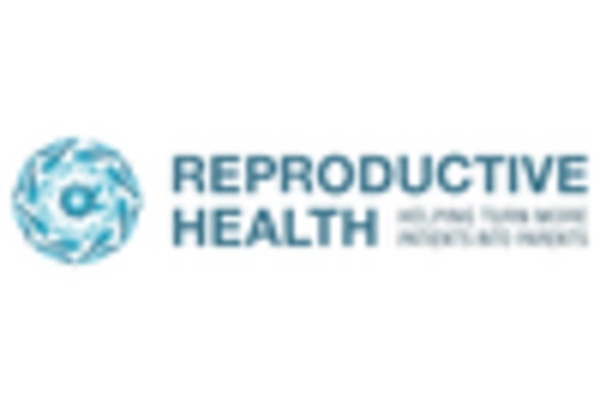Rising Infertility Rates
The increasing prevalence of infertility in the US is a primary driver for the assisted reproductive-technology market. Factors such as delayed childbearing, lifestyle choices, and medical conditions contribute to this trend. According to the CDC, approximately 12% of women aged 15-44 experience difficulty in conceiving, which translates to millions of potential patients seeking assisted reproductive services. This growing demand for fertility treatments, including in vitro fertilization (IVF) and intrauterine insemination (IUI), propels the market forward. As more individuals and couples face challenges in starting families, the assisted reproductive-technology market is likely to expand, with healthcare providers adapting to meet the needs of this demographic.
Increased Insurance Coverage
Expanding insurance coverage for fertility treatments is a crucial driver of the assisted reproductive-technology market.. Many states in the US have enacted laws requiring insurance companies to provide coverage for infertility treatments, which has made these services more accessible to a broader population. As of 2025, approximately 15 states mandate some level of fertility treatment coverage, which has led to a notable increase in the number of patients seeking assistance. This financial support alleviates the burden of high treatment costs, which can exceed $15,000 per cycle for IVF. Consequently, the assisted reproductive-technology market is likely to experience growth as more individuals can afford these essential services.
Innovations in Treatment Options
Continuous innovations in treatment options significantly influence the assisted reproductive-technology market. Advances in techniques such as preimplantation genetic testing (PGT), cryopreservation, and embryo culture have improved success rates and patient outcomes. For instance, the introduction of time-lapse imaging technology has enhanced embryo selection, leading to higher implantation rates. the market is projected to grow as these innovations become more widely adopted, potentially leading to new therapies and procedures.. As patients become more informed about their options, the demand for cutting-edge treatments is expected to rise, further driving the assisted reproductive-technology market.
Educational Initiatives and Awareness Campaigns
Educational initiatives and awareness campaigns play a pivotal role in shaping the assisted reproductive-technology market. Organizations and healthcare providers are increasingly focused on informing the public about fertility issues and available treatments. These efforts aim to reduce stigma and encourage individuals to seek help when facing reproductive challenges. As awareness grows, more people are likely to explore assisted reproductive options, leading to increased demand for services. The market may see a surge in inquiries and consultations as educational programs highlight the importance of reproductive health, ultimately driving growth in the assisted reproductive-technology market.
Growing Acceptance of Alternative Family Structures
Evolving societal norms regarding family structures contribute to the growth of the assisted reproductive-technology market.. Increasing acceptance of single parenthood, same-sex couples, and non-traditional family units has led to a higher demand for fertility services. Many individuals in these demographics seek assisted reproductive technologies to achieve their family-building goals. As societal attitudes continue to shift, the market is expected to expand, accommodating diverse family needs. This trend indicates a broader recognition of the importance of reproductive health and the role of assisted reproductive technologies in fulfilling family aspirations.
















